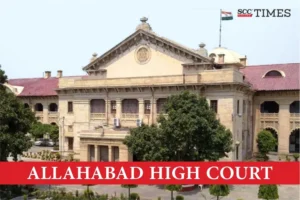Allahabad High Court: In a bail plea filed by Member of Legislative Assembly (‘MLA’) Abbas Ansari, who is implicated in a criminal case, over allegations including extortion, misuse of privileges during incarceration, and planning an escape from jail with the aid of his wife and associates, Jaspreet Singh, J., after noting the recovery of mobile phones from Abbas Ansari’s wife in jail premises and the alleged dereliction of duty by prison authorities, expressed concern over the potential influence he could wield, particularly over witnesses and law enforcement. Thus, the Court has refused to grant him bail.
Background
The case revolves around Abbas Ansari, a sitting MLA from Mau Assembly, who is implicated in a criminal case under various Sections of the Sections 387, 222, 186, 506, 201, 120-B, 195-A and 34 of the Penal Code, 1860 (‘IPC’), Sections 7, 8 and 13 of the Prevention of Corruption Act, 1988, Section 42 (b), 54 of Prisons Act, 1894 and Section 7 of Criminal Law (Amendment) Act, 2013. The allegations include extortion, misuse of privileges during incarceration, and planning an escape from jail with the aid of his wife and associates.
The genesis of the case traces back to the lodging of a FIR in February 2023, alleging that Abbas Ansari, while in jail, utilized his wife’s mobile phones to threaten witnesses and officials connected to his prosecution. Additionally, it is claimed his wife allegedly visited the jail frequently without following protocols, and Abbas Ansari received special privileges during his incarceration, allegedly facilitated by payments to jail officials. It was also alleged that during a surprise inspection by the District Magistrate and the Superintendent of Police, Abbas Ansari was found absent from his barrack, being instead with his wife in an adjacent room. Subsequently, items including mobile phones, cash, and foreign currency were recovered from his wife’s possession.
Further allegations also suggested a plot to stage Abbas Ansari’s escape, with threats to witnesses who might not cooperate in future.
Contentions of Abbas Ansari
Abbas Nasari contended that the FIR primarily accuses his wife and other co-accused, most of whom were police personnel or jail authorities, and that despite the charge sheet being filed, no evidence links him to extortion or threats, as alleged in the case.
He further insisted that his criminal history, except for one case, resulted in bail being granted, including by the Supreme Court.
He emphasized his status as a legislative assembly member and a national-level rifle shooter, and further contended that the charges against him were primarily under IPC sections directed at public servants, but his involvement remained unproven.
Contentions of the State
The State argued against granting bail, alleging that ample evidence was available that would implicate Abbas Ansari, jail authorities, and the wife’s driver in an escape plan.
It was contended that the statements from the Deputy Jailor highlighted irregularities regarding Abbas Ansari’s wife’s unrestricted access to the jail and his free movement inside.
The State further raised concerns about Abbas Ansari’s substantial influence, both financially and physically, potentially tampering with witnesses if released.
Decision and Analysis
Upon considering the contentions of both parties and perusing the material on record the Court noted that Abbas Ansari had a criminal history involving ten cases, with the earliest dating back to 2019 and the latest being the instant case. It was observed that between 2019 to 2023, he had been implicated in ten cases, including one under the Prevention of Money Laundering Act (PMLA). The Court acknowledged that, except for the PMLA case, Abbas Ansari had been granted bail in all other cases, including by the Supreme Court.
The Court referred to Brijmani Devi v. Pappu Kumar, (2022) 4 SCC 497, and highlighted the parameters required to be considered while exercising discretion in granting bail, specifically emphasizing that while discretion must be exercised judiciously, an order devoid of relevant reasons could be considered a violation of principles of natural justice. The Court also highlighted the importance of ensuring the purity of the trial while balancing the rights of the accused and the society.
Further drawing from Munilakshmi v. Narendra Babu, 2023 SCC OnLine SC 1380, the Court emphasized the narrow scope of interference in bail orders during judicial review, while acknowledging the delicate balance between the right to liberty and the need for a fair trial, stressing that bail terms must ensure a fair and free trial is not impeded. However, the Court noted that if an undertrial attempts to misuse bail, such as by influencing witnesses or tampering with evidence, the concession of bail could be withdrawn.
Applying the aforementioned parameters to the facts of the instant case, the Court observed that Abbas Ansari, as a Member of Legislative Assembly and a national-level rifle shooter, held positions of responsibility and should uphold higher standards of conduct.
Further noting the recovery of mobile phones from Abbas Ansari’s wife in jail premises and the alleged dereliction of duty by prison authorities, the Court expressed concern over the potential influence he could wield, particularly over witnesses and law enforcement.
In light of the evidence yet to commence and the potential impact on witnesses, the Court thereby decided not to grant bail to the Abbas Ansari at this stage. Instead, The Court directed the Trial Court to expedite the trial and ensure no unnecessary adjournments were sought. The Court further clarified that its observations should not be construed as an expression of opinion on the merits.
[Abbas Ansari v. State of U.P., 2024 SCC OnLine All 1340, Order dated 01-05-2024]
Advocates who appeared in this case :
Advocates for the Applicant: Pranjal Krishna, Arun Sinha, Pranjal Krishna, Siddhartha Sinha
Advocate for the State: Government Advocate


